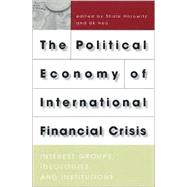
| List of Figures and Tables | p. vii |
| Introduction, Theoretical Overview, and Economic Background | |
| Explaining Precrisis Policies and Postcrisis Responses: Coalitions and Institutions in East Asia, Latin America, and Eastern Europe | p. 3 |
| The Persistent Liberalizing Trend in Foreign Economic Policies: The Role of Dispersed Interest Groups, Policy Legacies, and Ideologies | p. 15 |
| The World Financial Crisis: Are the IMF Prescriptions Right? | p. 41 |
| Southeast Asia Comparative Case Studies | |
| Thailand: Episodic Reform, Regulatory Incapacity, and Financial Crisis | p. 65 |
| Malaysia: Ethnic Cleavages and Controlled Liberalization | p. 91 |
| Indonesia: Cronyism, Economic Meltdown, and Political Stalemate | p. 111 |
| East Asia Comparative Case Studies | |
| Japan: Prosperity, Dominant Party System, and Delayed Liberalization | p. 133 |
| South Korea: Democratization, Financial Crisis, and the Decline of the Developmental State | p. 151 |
| Taiwan: Sustained State Autonomy and a Step Back from Liberalization | p. 165 |
| Latin America Comparative Case Studies | |
| Mexico: Crises and the Domestic Politics of Sustained Liberalization | p. 179 |
| Brazil: Political Institutions and Delayed Reaction to Financial Crisis | p. 199 |
| Argentina: The Political Economy of Stabilization and Structural Reform | p. 213 |
| Central and Eastern Europe Comparative Case Studies | |
| Poland, Hungary, and the Czech Republic: National Identity and Liberalizing Consensus | p. 225 |
| Russia: Entrenched Elites Ride Out the Crisis | p. 243 |
| Economic Indicators | p. 265 |
| Bibliography | p. 271 |
| Index | p. 285 |
| About the Contributors | p. 295 |
| Table of Contents provided by Syndetics. All Rights Reserved. |
The New copy of this book will include any supplemental materials advertised. Please check the title of the book to determine if it should include any access cards, study guides, lab manuals, CDs, etc.
The Used, Rental and eBook copies of this book are not guaranteed to include any supplemental materials. Typically, only the book itself is included. This is true even if the title states it includes any access cards, study guides, lab manuals, CDs, etc.